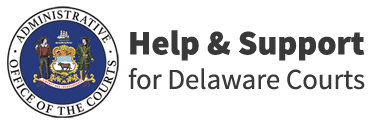The Supreme Court of Delaware: Oral Arguments
The Delaware Supreme Court is the highest court in the State of Delaware. The Court has final, appellate jurisdiction (which it must accept) in criminal cases in which the sentence exceeds certain minimums, in civil cases as to final judgments and for certain other orders of the Court of Chancery, the Superior Court, and the Family Court. The Supreme Court has discretionary jurisdiction to issue writs of prohibition, quo warranto, certiorari, mandamus or to accept appeals of certain non-final orders or certified questions. The Court processes about 550 to 600 cases each year. There is no intermediate appellate court in Delaware. The Supreme Court has offices in all three counties of the State. The Court sits in Dover but the justices maintain their chambers in the counties where they reside.
The Court decides appeals strictly on the basis of the record in the court below and the written briefs. Parties before the Supreme Court are not permitted to conduct discovery, call witnesses, or offer any evidence that was not presented first to the court below.
The Court's procedures are published in the Rules of Court and further explained in the Court's Internal Operating Procedures and the Appellate Handbook.
The Justices
Although Delaware has had a Supreme Court since 1776, a separate and modern Supreme Court was established in 1951 by constitutional amendment. The State's first separate Supreme Court initially consisted of three justices, and was enlarged to the current five justices in 1978.
The Supreme Court consists of a chief justice and four justices who are appointed by the Governor and confirmed by the Senate. The justices are appointed for 12-year terms. They must be learned in the law and citizens of the State. Three of the justices must be of one of the major political parties while the other two justices must be of the other major political party.
Oral Argument
The Court hears oral argument in about 30% of its cases. The rest are decided in conference on the briefs and the record. Oral argument is a presentation by the lawyers and questions from the court on the facts and the law involved in a case being appealed.
Oral argument, a tradition that dates back to the early days of the English court system, is also used in the Supreme Court of the United States and state appellate courts throughout the country.
Before a case is argued, the justices will have read the briefs and appendices filed with the Clerk of the Supreme Court. These documents set forth the parties' respective positions and assist the justices in deciding the case. Oral argument is the only opportunity the justices have to question, in person, the attorneys representing litigants about issues raised in their briefs.
The appellant usually presents its argument first with an opportunity to reserve part of the allotted time for rebuttal. Each side has 20 minutes to argue its case before a three-justice panel of the Court and 25 minutes before the en Banc (five member) Court.
The justices usually sit in panels of three Justices to decide most cases, but they may also sit en Banc if a panel is unable to reach a unanimous decision, if a death sentence is being reviewed, or in certain other instances. On occasion, a justice may enter a disqualification in a case because of a prior connection to the case, a conflict of interest or other customary reasons for recusal. When this happens, a judge from the Court of Chancery, the Superior Court, or a retired Justice can be appointed to sit with the Court.
After Oral Argument
The justices hold a conference on each case after oral argument (they do not normally discuss the merits of a case before argument). At this time, the justices may take a tentative vote on how the Court should resolve the case. The voting proceeds in reverse order of seniority. Final opinions and orders of the Court must be in writing. The Chief Justice or the head of the panel if the Chief Justice is not assigned to the case, assigns the case to a justice to write the opinion or order. When the draft is complete, the authoring justice circulates it privately among the other justices for review and comment.
Once an opinion is completed and approved by a majority
of the justices, it is filed with the Clerk of the Supreme Court or a
deputy clerk. The attorneys are notified and the opinion is released to
the public. Opinions of the Delaware Supreme Court are published in the
Atlantic Reporter and the Delaware Reporter published by West Publishing
Company. As a service to the public, Supreme
Court final opinions and orders are posted on this web site. The site
also includes court forms, rules, and photographs and biographies of current
justices.

